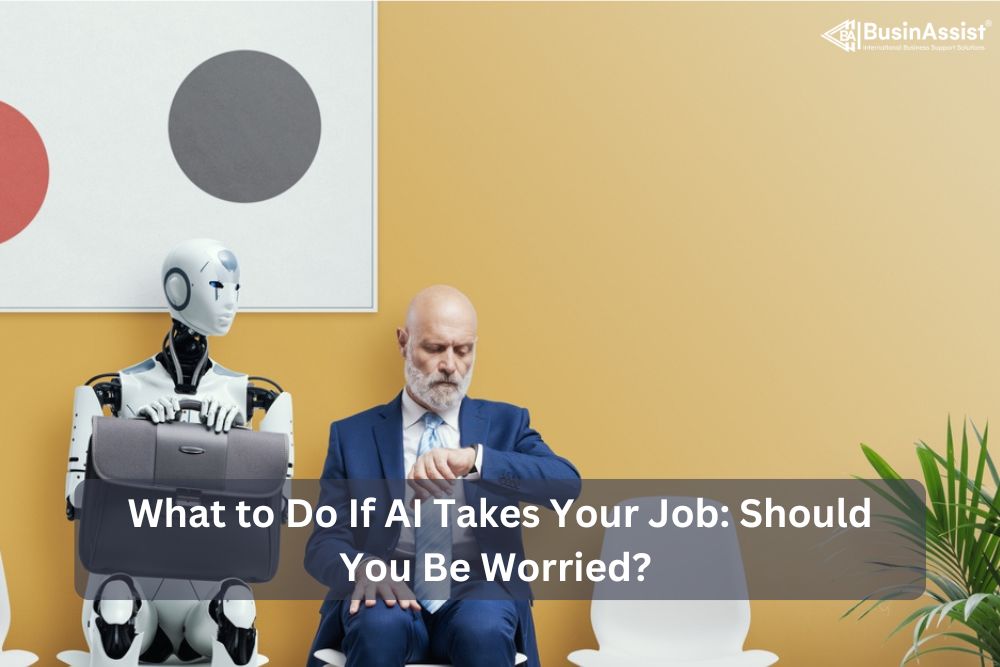Last Updated on December 17, 2025 by Joy Kyalo

The fast rise in technology has led to numerous concerns regarding its effects on labour productivity. Questions are asked on how secure human jobs are with the evolution of artificial intelligence (AI) in the market industries. What to Do If AI Takes Your Job?
AI has become something for people to rely on, to make their operations seamless.
AI generates articles, essays, and concepts, helps in brainstorming, drafts emails, and locates customer information that will assist businesses in making well-informed decisions.
So should you be concerned if automation by AI renders you jobless? While it may appear terrifying, several steps can assist you in understanding what to do if AI takes your job and help you adapt to the evolving landscape.
Which jobs are most at risk of replacement by AI?
AI is transforming many industries, and some jobs are more at risk of being replaced than others. Such jobs at risk include:
Data entry:
As new improvements in AI automation continue to occur, data entering and analysing tasks are being made simpler or easier than before. This is because AI algorithms can perform these tasks on a huge volume of data within a very short time thus avoiding errors for efficiency purposes. There is a real danger that jobs concentrating entirely on data entries or simple analytical functions may be supplanted by AI-supported software programs as well as systems. It is therefore important for those working in such professions to have other skill sets that will enable them to stay ahead of the competition and adjust according to emerging demands.
Customer service:
Tasks concerning customer service particularly those that include basic inquiries or repetitive skills have the potential for attacks from AI systems. There are instances where an organisation can use chat-bots, virtual assistants as well as voice recognition technology to provide effective and cheap forms of customer support without the utilisation of human beings. Nonetheless, human beings remain important when it comes to more complicated issues but AI systems can take charge of many types of customer discussions.
Manufacturing and production:
Historically, positions in the production and assembly line have always been subject to automation. With the improved accuracy, speed, and cost-effectiveness of AI-powered robots and machines, they have become the most sought-after substitutes. Assembly work, for instance, may be easily learned by machine learning algorithms because it involves repetitive processes or physical labour. This endangers jobs on the production lines.
Retail and sales:
Unlike other fields, the retail field has been largely upset by AI systems. Inventory management, stocking, and packaging activities can now be done by robotic automation systems in warehouses and retail outlets. Thanks to improvements in computer vision, shelf-monitoring robots can carry out inventory control without human aid. AI may not entirely do away with retail jobs but it represents a big change in employment patterns where there are few places requiring physical work.
Transportation and logistics:
The transport industry is an obvious example of how AI has impacted jobs. Self-driving cars and trucks are part of autonomous vehicles that may replace most drivers soon. Nevertheless, fears about safety and regulations hang over it like a cloud when compared with the speed at which autonomy develops. What this means is that driving jobs are in danger hence reskilling and upskilling initiatives should be considered more seriously than ever.
Financial analysis:
In executing financial analysis, prognostications, and consultancy, AI has been found so good. Machine learning algorithms can examine huge volumes of financial data within seconds thus giving precise forecasts and suggestions. A vast number of financial analysts and advisors are therefore endangered. Consequently, professionals in this domain must concentrate on high-level strategic responsibilities while augmenting themselves with data interpretation skills as well as complex problem-solving techniques to remain relevant.
What to Do If AI Takes Your Job: Adapting to the AI Revolution and Staying Ahead
While certain jobs are at risk, there are actionable steps you can take to adapt and thrive in an AI-driven world. Understanding what to do if AI takes your job can help you stay ahead and prepare for new opportunities.
Stay informed:
People ought to have extensive knowledge about Artificial Intelligence. Instead of teeming one’s mind with horror stories about what it is likely going to do, we should try to think about it from a positive point of view; as something that can make us more productive or better skilled. You can find examples of successful integration of this software where there are jobs that it does not entirely replace but enhances instead.
Upskill and reskill:
It is crucial to evaluate your ongoing ability and identify areas where you could learn and improve. AI performs redundant and monotonous work, allowing you to devote your efforts to those more demanding and imaginative responsibilities. The acquisition of new knowledge about the upcoming technologies as well as enhancing skills could ensure that one becomes an invaluable member of the team and also open up avenues for other roles in the entity.
In addition, it would be good to consider developing skills that are humanly unique because replication by AI is difficult. AI will be widely used hence some of the skills that remain valuable include empathy, critical thinking, problem-solving, and adaptability. Therefore, investing time into these skills will be necessary to remain relevant within an AI-driven workplace.
Networking and collaborating:
Networking and fostering connections with people in your industry may help you cope with AI transformations. Take part in sector events, go to symposiums, and enrol in vocational societies so that you can acquire priceless information as well as meet peers. The company of those who are also having these problems is instructive and helpful when things are changing.
Career change:
It could also be an advantageous alternative to shift careers or look for associated positions inside your sector in case AI replaces your work. Search for the sub sectors that match best with what you already know, have done before, and are capable of doing. By being flexible and receptive to new chances, it will be possible for you to embark on positions that are likely to escape mechanisation.
Embrace lifelong learning:
The job market is always evolving. By committing to continuous learning, you can stay ahead of trends and be prepared for new opportunities that arise as technology advances
Leverage AI as a tool:
Instead of viewing AI as a competitor, see it as a tool that can enhance your productivity and efficiency. Understanding how to work alongside AI can make you an indispensable asset to your organisation
Focus on human-centric roles:
Jobs that require human interaction, empathy, and complex decision-making are less likely to be fully automated. Roles in healthcare, education, and creative industries often require a human touch that AI cannot fully replicate
Maintain a positive mindset:
Change can be daunting, but it also brings new possibilities. Staying positive and proactive can help you navigate transitions more smoothly and find new paths to success.
Conclusion:
In conclusion, lifelong learning is very crucial. The speed at which technology develops implies that skills quickly become old-fashioned. Being up to date with industry trends and continuously looking for opportunities to learn ensures you stay ahead of the game. Besides enabling you to adjust to the changes in your professional area, continuous education also encourages resilience and a growth mindset. Understanding what to do if AI takes your job is essential in this process, as it prepares you to adapt and thrive in a rapidly evolving job market.
Although there are some fears about the increased use of AI, it should be taken positively. Instead of being anxious about it, focus on its potential for personal development, skills enhancement, and career growth among others. To be able to flourish in an AI-driven future, we need to make use of AI as tools, but first human abilities need to be acquired. The other thing is that you have to build your network by pacing yourself into new roles while at the same time promoting lifelong learning.
Inspired to start your own company? BusinAssist can help you start a UK limited company seamlessly no matter where you are located. We are the leading provider in global Ltd company formation and business support solutions.
We have a range of UK company formation and London virtual office packages to help you embark on your entrepreneurship journey. We also have additional services to help your business operation seamless as you focus on the growth of your business.
For more information, contact us at info@businassist.com.
FAQs
Q: What jobs can AI take?
Ans: Data Entry Clerks: AI can efficiently handle data input and management tasks.
Telemarketers: AI-powered chatbots and voice assistants can manage customer inquiries and sales calls.
Accountants: AI can automate bookkeeping, tax preparation, and other accounting tasks.
Content Moderators: AI algorithms can filter and moderate online content.
Proofreaders: AI tools can check grammar, spelling, and style in written content.
Q: Can AI take over finance jobs?
Ans: AI is already making significant changes in the finance sector, automating various tasks and processes. Some finance jobs that AI can potentially take over or significantly impact are financial analysts, loan officers, customer representatives, auditors, and traders.
Q: Can AI take over engineering jobs?
Ans: AI is transforming the engineering field, but rather than taking over jobs entirely, it is more likely to change the nature of engineering work. AI is impacting engineering jobs by assisting in handling repetitive and data-intensive tasks allowing engineers to focus on more complex and creative aspects of their work.
Q: How to prevent AI from taking over jobs?
Ans: To prevent AI from taking over jobs, people should upskill and reskill especially the skills that AI cannot easily replicate. Additionally, one can embrace AI and learn how to work alongside it. Individuals can also focus on human-centric roles that require human interaction, empathy, and complex decision making.
Q: When will AI take over jobs?
Ans: The impact of AI on jobs is evolving. While AI is already transforming many industries, the timeline for AI to significantly take over jobs varies depending on the sector and the nature of the work.
Read Also:
- Right to Work in the UK: How to Obtain a Share Code Online
- How Long Does It Take to Sponsor an Employee in the UK?
- Everything You Need to Know About Companies House Default Address
- What Are the Disadvantages of a Dormant Company?
- Why is Coworking The Perfect Place For Your Startup?
- Remote Work 101: How Can Businesses Adapt?
- What Is a Minute Book? Key Corporate Recordkeeping Explained
- How Many UK Bank Holidays in 2025? Get the Full List Here
- Company Resolution: Understanding the Different Types of Resolution in Business

The BusinAssist Editorial Team has 15+ years of experience writing about small business and company formation in the UK, Canada, and the USA. We simplify complex processes and provide practical insights to help entrepreneurs succeed. Business Assist with BusinAssist – your partner for business success.

